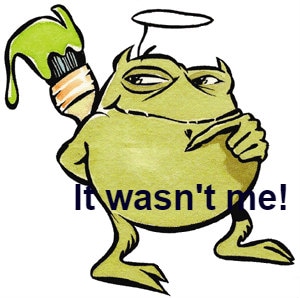A study in the Journal of Experimental Child Psychology has shown that kids who told prosocial lies had better performance on measures of working memory and inhibitory control. Instead of reflecting laziness, prosocial lying seems to entail a great deal more cognitive and emotional effort than truth-telling. But a 2014 study found that tired adults are far less likely to engage in prosocial lying! As kids get older, though, the relationship between theory of mind and dishonesty starts to shift. Young children with a high theory of mind will tell more antisocial lies but as they get older, that changes. They begin telling more prosocial lies and fewer antisocial ones. And here's something I sure didn't know; as kids age, they begin telling "blue lies." These are altruistic falsehoods that are sometimes told at the cost to the liar, but will benefit or protect a group. Think of a lie told to protect classmates, or the family.
Although caregivers can, and do, teach children to tell polite lies, Harvard psychologist Warneken says that it's more likely that successful prosocial lying is "a byproduct of developing other capabilities, like empathy and self-control." At some point, kids begin to develop the ability to detect lies from others and can distinguish those that are selfish (antisocial) from those that are selfless (prosocial). Several studies done in 2015 found that the human brain is resistant to deception, after prosocial, or white lies, are told. But when self-serving lies (antisocial or black lies) are told that resistance seemed to decrease.
So, you might ask, why is Irwin writing about lying? Isn't lying a bad thing? And the answer is yes...and no. Not all lies are the same. Most humans recognize this fact in their brains as well as in their bodies. And even though parents teach children to lie, both implicitly with their behavior and explicitly with their words, some of those lies actually help to bind the family together and create feelings of trust. Other lies can destroy those very same feelings of safety and security. You may think that the best solution is simply to teach your children not to lie. The trouble with that solution is that children can plainly see that lies are being told everywhere. And as they grow up, they soon discover that not all lies are created equal, meaning they don't have the same motivation or impact. So what to do?
Lies, when told to hurt others, are never good. And there should always be a distinction made between telling the (sometimes cruel) truth and constructive criticism. If someone asks for the honest truth, there is always a way to deliver the less-than-good news other than by just being cold and heartless. And that's where constructive criticism comes into play. The best answer to this complex question is the same for telling either white or black lies, and holds true for both kiddos and adults; other people's feeling matter. And just like with all other things, empathy and kindness should always be your guide.

 RSS Feed
RSS Feed